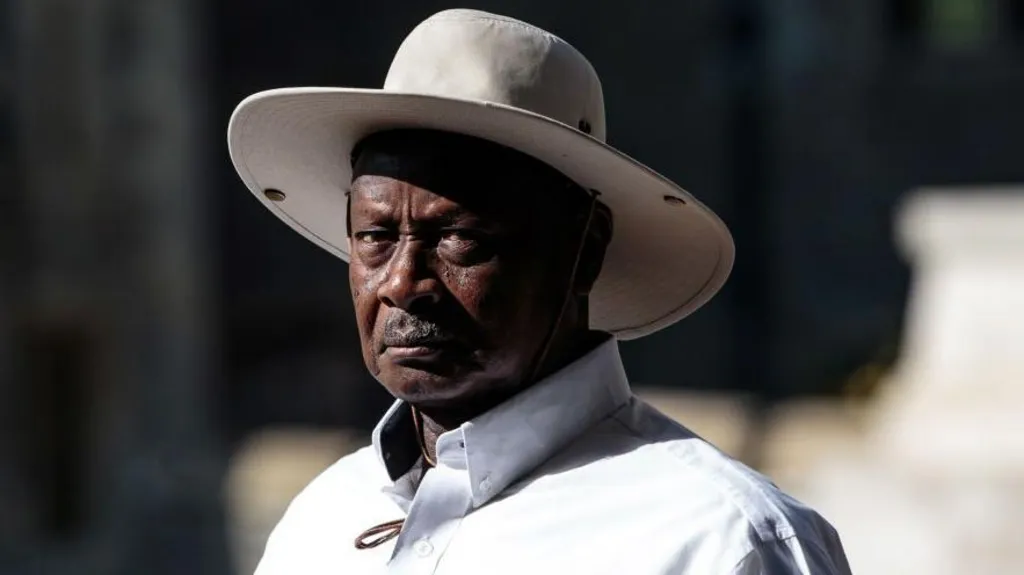Ugandan opposition leader Bobi Wine has issued a warning about the country’s worsening political environment ahead of presidential elections set for January 2026.
Speaking from the National Unity Platform (NUP) headquarters in Kampala, the 43-year-old lawmaker declared the political atmosphere has “gone from bad to worse,” citing threats to his life and growing repression against activists opposing President Yoweri Museveni.
Wine, whose real name is Kyagulanyi Ssentamu, described the threats he faces from the regime as explicit. “They come in no unclear terms,” he said, highlighting the escalating danger surrounding Uganda’s most prominent opposition movement.
The threats have been intensified by Museveni’s son and army chief, Gen. Muhoozi Kainerugaba, who is widely seen as his father’s intended successor. In January, Kainerugaba tweeted that he “would cut off” Wine’s head if allowed by the president. Then, in May, he attracted further condemnation after claiming to hold Wine’s missing bodyguard “in my basement.” The bodyguard later appeared in court, unable to walk unaided, raising suspicions of torture. “It’s a constant reminder that the threat is real,” Wine said, referring to Kainerugaba.
“This is no ordinary person. This is a person that is not only the son of the person in charge of the country but is also the person in charge of all the organs of violence. He heads the military, the police, the prisons, you know. He is above the law, and he has acted as such.”
Bobi Wine
President Museveni, now 80 and in power since 1986, has dismissed Wine as an agent of foreign influence and questioned his patriotism. Wine, however, commands significant support from Uganda’s urban working class and youth. His NUP party holds more parliamentary seats than any other opposition group.

Uganda Faces Rising Political Tensions
In the 2021 election, Wine secured 35% of the vote to Museveni’s 58%, the incumbent’s worst showing since taking power. Wine claimed the results were rigged through ballot stuffing and manipulation, allegations that electoral authorities rejected.
Since that election, Wine’s party says dozens of its supporters have disappeared or been detained without charge. Wine views the persecution as part of a coordinated effort to “send fear down the nerves of all those that work with me and all those that stand for what I stand for.”
Museveni has been on the campaign trail in Kampala, targeting the same urban populations that form the backbone of Wine’s support. These communities, often economically marginalized, remain hopeful that a change in leadership could deliver better opportunities.
Wine, who describes himself as the “ghetto president,” has remained a prominent national figure since transitioning from his musical career into politics. His rise began in the early 2000s as a dancehall artist whose songs eventually shifted into political commentary, earning him public respect and government scrutiny.
He officially entered politics in 2017 after winning a parliamentary seat, and has since become Museveni’s strongest challenger in decades. As the next election approaches, Wine has urged supporters to turn out in what he calls a “protest vote” against corruption, repression, and what he describes as a slide toward dynastic rule.
Wine’s campaign has faced continual resistance. His rallies are frequently blocked by security forces under the pretext of maintaining public order. In response to the rising security tensions, Kainerugaba recently announced that government-provided guards would be assigned to all presidential candidates, warning against independent security arrangements. Kainerugaba’s political ambitions have only intensified fears of entrenched family rule in a country that has never experienced a peaceful transition of power since independence in 1962.
“It speaks of state capture. It speaks of impunity. It speaks of family rule,” Wine said of the threats he faces. Despite the pressure, he insists his commitment to change remains unshaken. “Our resolve has become firmer,” he declared.
READ ALSO: Kpemka Admits NPP’s 2024 Defeat Was a National Tsunami























